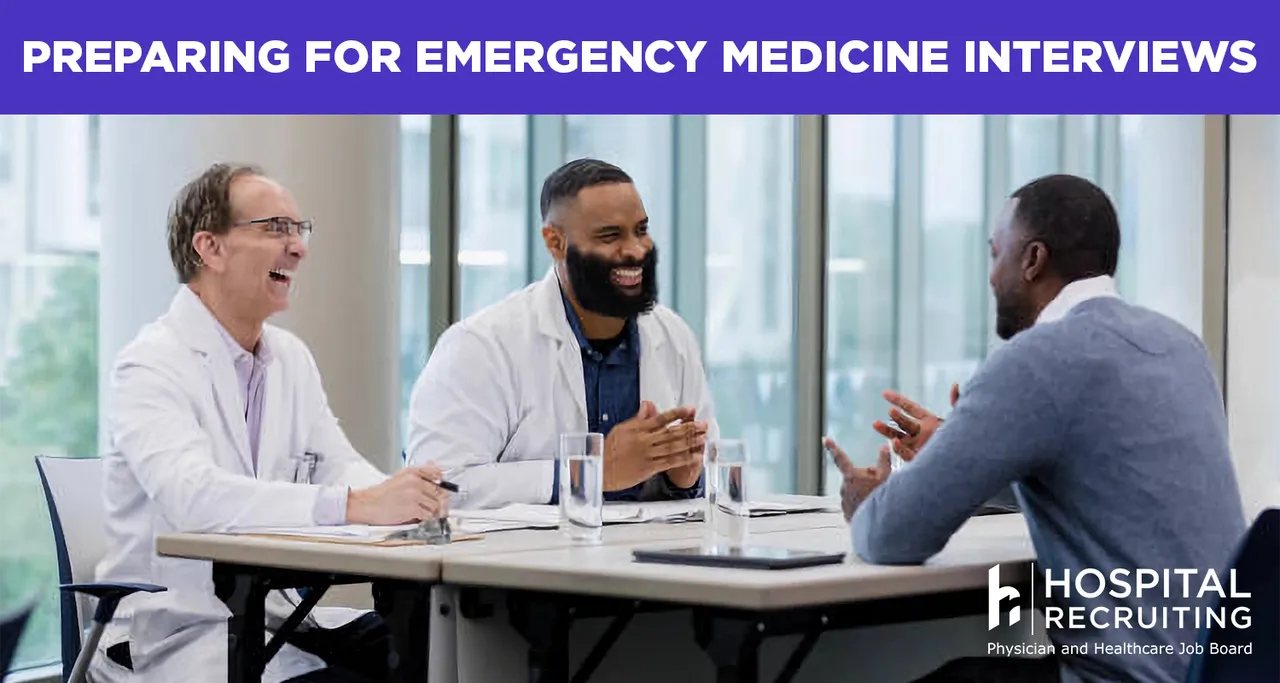How to Prepare for an Emergency Medicine Interview

The scope of emergency medicine is vast - from community, critical access hospitals to large, academic trauma systems. The interview processes to enter these facilities are as diverse as the facilities available. However, there are some general concepts that you should know as an interviewee - ideas that will help you no matter where you're interviewing.
Below are big concepts to be aware of as a candidate for a new position.
Do your homework
If you want to appear as a serious candidate, avoid asking questions that have publicly available answers online.
To start, look at the hospital's website. Learn what services the hospital has (cardiology? neurology?), and which services they do not offer. Knowing what level of stroke center they are, whether they have a cath lab or whether they have pediatric services will give good insight into what your day will look like in the ED.
Also look at the website for the group you're interviewing with. This should provide an idea of whether you will be an independent contractor or employed. It will also show you where they staff, the internal structure of the organization and therefore, what your career trajectory may be.
Beyond this, public facing websites like CMS or online hospital directories can give you valuable information about the demographics of the facility.
Lastly, know who is interviewing you and what their roles are. Your conversation with a recruiter should be very different from your conversation with a medical director or CMO. Whomever is arranging your interview day should be able to provide you with this information beforehand.
Use your homework to prepare higher level questions
Invariably, you will be asked whether you have any questions. Use your information to ask questions like "I saw on the website that you have cardiologists but no cath lab was mentioned. Do we do caths at this facility?" or, "I see that your group staffs multiple facilities in this hospital system - is this position only at one of those facilities or will I be moving between several facilities?" These types of questions will communicate much more than questions like “Do cardiologists work at this hospital?”
This will indicate that you've already looked into the position and are a more interested and discerning applicant.
Prepare for conversation
Emergency medicine is a social experience. Your attitude is more important than your numbers as it comes to being viewed as a team member. Accordingly, many of the interviews are more conversational and informally structured. Your interviewer wants to know what it's going to be like to work a code with you at two in the morning. They want to know how you’ll get along with your physician and nursing colleagues. Will you help out, pick up shifts and be proactive or are you going to be a scheduling nightmare?
This is not information that can be directly obtained. Prepare to have a conversation to give a sense of who you are and how you'll fit in.
Know your stats
Despite the relatively informal nature of your interview, you should still be prepared to discuss your own productivity. In some cases, you may be asked to provide a feedback report from your current employer showing your own information. Patients per hour, admission rates or lengths of stay are all fair game for conversation. If asked, provide the numbers honestly. Your answers can be easily cross checked via references or will be discovered when you start working.
You should be prepared to not only know your numbers but what they mean and how they relate to your group. If you aren't the fastest doc overall but your numbers are average for your group, then explain your numbers in context. EDs see different numbers of patients with different acuities and each has its own problems - 2 patients per hour at a trauma center is very different than 2 patients per hour at a critical access hospital. So, be able to have those conversations objectively without becoming defensive or blaming.
You are also interviewing them.
It is as important that the job is a great fit for you as it is that you are a great fit for the job. Develop clarity about what you're looking for before you interview. Consider both structural and day to day experience itself.
For structural information, know the length and number of shifts, how they handle nights, holidays and weekends. Know how they handle disaster call, the pay, reimbursement and any benefits.
For the day-to-day clinical information, get a sense of the patients they see. How many pediatric patients do they see, are there patients who always get transferred out? It is also worth asking whether there is an opportunity to shadow during a shift for the best possible exposure to the daily operations.
**Editor's note: Considering your next EM opportunity? Why not start on our job board.**
Related Posts
